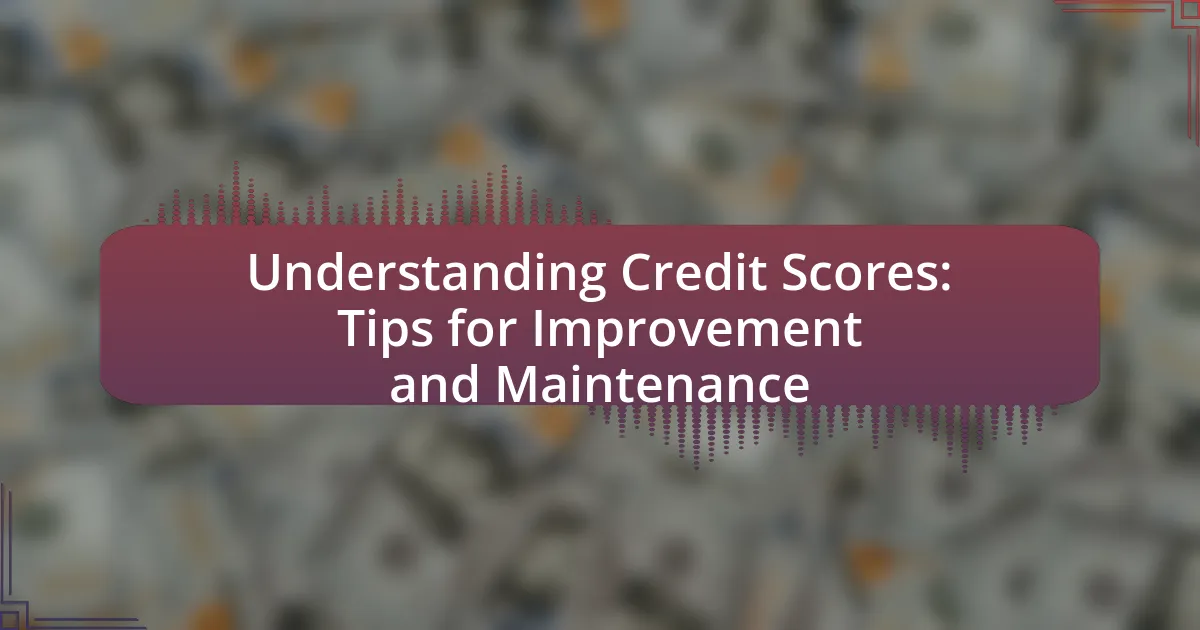The article focuses on mindful spending, defined as the practice of making intentional purchasing decisions that align with personal values and financial goals. It highlights the differences between mindful and traditional spending, emphasizing the importance of awareness, intentionality, and alignment with values. Key principles include recognizing financial habits, prioritizing meaningful purchases, and understanding the long-term impact of spending. The article also discusses the psychological benefits of mindful spending, such as reduced anxiety and increased satisfaction, and offers practical strategies for implementing mindful spending practices, including budgeting and reflection. Overall, it underscores how mindful spending can enhance financial well-being and personal fulfillment.

What is Mindful Spending?
Mindful spending is the practice of making intentional and conscious purchasing decisions that align with one’s values and financial goals. This approach encourages individuals to reflect on their needs versus wants, prioritize meaningful purchases, and consider the long-term impact of their spending habits. Research indicates that mindful spending can lead to greater financial satisfaction and reduced impulse buying, as it fosters a deeper connection between consumers and their purchases.
How does Mindful Spending differ from traditional spending?
Mindful spending differs from traditional spending in that it emphasizes intentionality and alignment with personal values. While traditional spending often focuses on immediate gratification and impulse purchases, mindful spending encourages individuals to reflect on their financial choices, considering the long-term impact and relevance to their values. Research indicates that consumers who practice mindful spending report higher satisfaction with their purchases and improved financial well-being, as they prioritize meaningful experiences over material possessions. This approach fosters a deeper connection between spending habits and personal values, leading to more fulfilling financial decisions.
What are the key principles of Mindful Spending?
The key principles of Mindful Spending include awareness, intentionality, and alignment with personal values. Awareness involves recognizing one’s financial habits and understanding the impact of spending choices on overall well-being. Intentionality emphasizes making deliberate purchasing decisions that reflect individual priorities rather than impulsive buys. Alignment with personal values ensures that expenditures support what is truly important to the individual, fostering a sense of fulfillment and satisfaction. These principles collectively encourage individuals to engage in thoughtful financial practices that enhance their quality of life and promote financial health.
How does awareness influence spending habits?
Awareness significantly influences spending habits by enabling individuals to make informed financial decisions that align with their values. When consumers are aware of their financial situation, spending triggers, and the impact of their purchases, they are more likely to prioritize essential items and avoid impulsive buys. Research indicates that individuals who practice mindfulness in their spending report higher satisfaction and lower regret, as they consciously evaluate their purchases against their personal values and long-term goals. For instance, a study published in the Journal of Consumer Research found that consumers who engage in mindful spending are more likely to invest in experiences rather than material goods, leading to greater overall happiness.
Why is aligning purchases with values important?
Aligning purchases with values is important because it fosters a sense of integrity and authenticity in consumer behavior. When individuals make purchasing decisions that reflect their personal beliefs and ethical standards, they contribute to a marketplace that prioritizes sustainability, social responsibility, and ethical practices. Research indicates that consumers are increasingly willing to pay more for products that align with their values; for instance, a 2020 Nielsen report found that 73% of global consumers would change their consumption habits to reduce environmental impact. This alignment not only enhances personal satisfaction but also drives businesses to adopt more responsible practices, ultimately leading to a positive societal impact.
What role do personal values play in financial decisions?
Personal values significantly influence financial decisions by guiding individuals in prioritizing their spending and investment choices. For instance, a person who values sustainability may choose to invest in eco-friendly companies or purchase products that are environmentally responsible. Research indicates that individuals often align their financial behaviors with their core beliefs; a study published in the Journal of Consumer Research found that consumers are more likely to support brands that reflect their personal values, leading to increased customer loyalty and satisfaction. This alignment between values and financial decisions not only shapes individual spending habits but also impacts broader market trends, as businesses increasingly cater to value-driven consumers.
How can Mindful Spending enhance personal fulfillment?
Mindful spending enhances personal fulfillment by aligning financial choices with individual values and priorities. When individuals consciously evaluate their purchases, they tend to invest in experiences or items that genuinely resonate with their beliefs and desires, leading to greater satisfaction. Research indicates that people who practice mindful spending report higher levels of happiness and well-being, as they feel more in control of their financial decisions and less stressed about money. This alignment fosters a sense of purpose and fulfillment, as spending becomes a reflection of one’s identity and aspirations.

What are the benefits of Mindful Spending?
Mindful spending offers several benefits, including improved financial well-being, enhanced emotional satisfaction, and alignment with personal values. By consciously evaluating purchases, individuals can avoid impulse buying, leading to better budgeting and reduced debt. Research indicates that consumers who practice mindful spending report higher levels of happiness and fulfillment, as their purchases reflect their true priorities and values. This alignment fosters a sense of purpose and satisfaction, ultimately contributing to a more meaningful financial life.
How does Mindful Spending contribute to financial health?
Mindful spending contributes to financial health by promoting intentional purchasing decisions that align with personal values and financial goals. This approach reduces impulsive buying, leading to better budget management and increased savings. Research indicates that individuals who practice mindful spending often report lower levels of financial stress and greater satisfaction with their financial situation, as they prioritize expenditures that genuinely enhance their quality of life. By focusing on meaningful purchases, mindful spending fosters a sustainable financial lifestyle, ultimately supporting long-term financial stability.
What impact does it have on budgeting and saving?
Mindful spending significantly enhances budgeting and saving by promoting intentional financial decisions that align with personal values. This approach encourages individuals to prioritize essential expenses and eliminate unnecessary purchases, leading to more effective allocation of resources. Research indicates that consumers who practice mindful spending report higher satisfaction with their financial choices and improved savings rates, as they focus on what truly matters to them rather than impulsive buying. Consequently, this alignment fosters a healthier financial mindset, ultimately resulting in better budgeting practices and increased savings over time.
How can it reduce impulse buying?
Mindful spending can reduce impulse buying by encouraging individuals to reflect on their values and priorities before making a purchase. This reflective process helps consumers distinguish between wants and needs, leading to more intentional buying decisions. Research indicates that individuals who practice mindfulness are less likely to engage in impulsive behaviors; for instance, a study published in the Journal of Consumer Research found that mindfulness can significantly decrease impulsive purchasing by fostering greater self-control and awareness of emotional triggers.
What psychological benefits does Mindful Spending offer?
Mindful spending offers several psychological benefits, including reduced anxiety and increased satisfaction with purchases. By aligning spending habits with personal values, individuals experience a greater sense of control over their financial decisions, which can lead to lower stress levels. Research indicates that when consumers make intentional purchases that reflect their values, they report higher levels of happiness and fulfillment. For instance, a study published in the Journal of Consumer Research found that individuals who engage in mindful spending are more likely to feel content with their financial choices, as they prioritize meaningful experiences over material possessions. This alignment fosters a positive emotional state and enhances overall well-being.
How does it promote a sense of control over finances?
Mindful spending promotes a sense of control over finances by encouraging individuals to make intentional purchasing decisions that align with their values. This approach allows individuals to prioritize their spending, reducing impulsive purchases and fostering a clearer understanding of their financial situation. Research indicates that consumers who practice mindful spending report higher satisfaction with their financial choices, as they feel more empowered and less stressed about their expenditures. By reflecting on personal values before making purchases, individuals can create a budget that reflects their priorities, leading to improved financial management and a greater sense of autonomy over their financial lives.
What effects does it have on stress and anxiety related to money?
Mindful spending significantly reduces stress and anxiety related to money by fostering a sense of control and alignment with personal values. When individuals engage in mindful spending, they make intentional choices that reflect their priorities, leading to increased satisfaction and reduced financial regret. Research indicates that aligning purchases with values can enhance emotional well-being, as individuals feel more fulfilled and less anxious about their financial decisions. A study published in the Journal of Consumer Research found that consumers who practiced mindful spending reported lower levels of financial stress and greater overall happiness, demonstrating the positive impact of this approach on mental health.

How can one practice Mindful Spending?
One can practice mindful spending by consciously evaluating purchases to ensure they align with personal values and financial goals. This involves creating a budget that reflects priorities, tracking expenses to identify spending patterns, and asking critical questions before making a purchase, such as whether the item is necessary or if it contributes to long-term happiness. Research indicates that individuals who engage in mindful spending report greater satisfaction and reduced financial stress, as they make more intentional choices that resonate with their values.
What strategies can help in aligning purchases with values?
To align purchases with values, individuals can adopt strategies such as prioritizing ethical brands, conducting thorough research on product origins, and creating a personal budget that reflects their values. Prioritizing ethical brands ensures that consumers support companies that align with their beliefs, such as sustainability or fair labor practices. Researching product origins helps consumers understand the impact of their purchases on the environment and society, allowing them to make informed decisions. Additionally, a budget that reflects personal values encourages mindful spending, ensuring that financial resources are directed toward products and services that resonate with one’s principles. These strategies collectively foster a purchasing behavior that is consistent with individual values.
How can creating a spending plan enhance Mindful Spending?
Creating a spending plan enhances mindful spending by providing a structured approach to financial decisions, allowing individuals to align their purchases with their values. A spending plan helps individuals prioritize their expenses, ensuring that money is allocated to areas that reflect personal beliefs and goals, rather than impulsive purchases. Research indicates that individuals who use budgeting techniques report higher satisfaction with their financial situation and a greater sense of control over their spending habits, which reinforces mindful spending practices.
What role does reflection play in the spending process?
Reflection plays a crucial role in the spending process by enabling individuals to evaluate their purchasing decisions against their personal values and financial goals. This introspection helps consumers identify whether their spending aligns with what they truly value, leading to more intentional and satisfying purchases. Research indicates that mindful spending, which incorporates reflection, can enhance financial well-being and reduce buyer’s remorse, as individuals become more aware of their motivations and the impact of their choices on their overall happiness.
What tools and resources are available for Mindful Spending?
Tools and resources available for mindful spending include budgeting apps, financial education platforms, and community workshops. Budgeting apps like Mint and YNAB (You Need A Budget) help users track expenses and set financial goals, promoting awareness of spending habits. Financial education platforms such as Khan Academy and Coursera offer courses on personal finance, enhancing understanding of money management. Community workshops often provide hands-on guidance and support, fostering a culture of mindful spending. These resources collectively empower individuals to align their purchases with their values, ultimately leading to more intentional financial decisions.
How can budgeting apps assist in practicing Mindful Spending?
Budgeting apps assist in practicing mindful spending by providing users with real-time tracking of their expenses and income, which fosters awareness of financial habits. These applications categorize spending, allowing individuals to see where their money goes and identify areas that may not align with their values. For instance, a study by the National Endowment for Financial Education found that individuals who actively track their spending are more likely to make conscious financial decisions. By visualizing their financial data, users can make informed choices that reflect their priorities, ultimately leading to more intentional spending aligned with their personal values.
What educational resources can deepen understanding of values-based spending?
Books such as “Your Money or Your Life” by Vicki Robin and Joe Dominguez provide comprehensive insights into values-based spending by encouraging readers to evaluate their financial choices in relation to their personal values. Additionally, online courses like those offered by Coursera on personal finance often include modules focused on aligning spending with individual values, enhancing understanding through structured learning. Furthermore, workshops and seminars hosted by organizations like the Financial Planning Association emphasize the importance of values in financial decision-making, providing practical tools and frameworks for participants. These resources collectively deepen the understanding of values-based spending by combining theoretical knowledge with practical application.
What are some common challenges in Mindful Spending?
Common challenges in mindful spending include impulse buying, emotional spending, and societal pressure. Impulse buying often occurs when individuals make unplanned purchases, which can derail their budgeting efforts. Emotional spending is another challenge, where individuals purchase items to cope with feelings such as stress or sadness, leading to financial strain. Additionally, societal pressure can influence spending habits, as individuals may feel compelled to buy products to fit in or maintain a certain lifestyle, conflicting with their values. These challenges can hinder the ability to align purchases with personal values and financial goals.
How can one overcome societal pressures to spend?
One can overcome societal pressures to spend by practicing mindful spending, which involves aligning purchases with personal values and financial goals. This approach encourages individuals to critically assess their motivations for spending, distinguishing between genuine needs and societal expectations. Research indicates that individuals who set clear financial goals and budgets are less likely to succumb to external pressures, as they have a defined framework guiding their decisions. For instance, a study published in the Journal of Consumer Research found that consumers who engage in value-based spending report higher satisfaction and lower levels of financial stress, demonstrating the effectiveness of mindful spending in resisting societal influences.
What strategies can help resist impulse purchases?
To resist impulse purchases, individuals can implement strategies such as creating a budget, utilizing a shopping list, and practicing the 24-hour rule. Establishing a budget helps define spending limits, which can prevent unplanned purchases. A shopping list ensures that only necessary items are bought, reducing the likelihood of impulse buys. The 24-hour rule encourages waiting a day before making a purchase, allowing time to evaluate the necessity of the item. Research indicates that these strategies can significantly decrease impulsive buying behavior, as they promote mindful spending aligned with personal values.
What are practical tips for implementing Mindful Spending?
Practical tips for implementing mindful spending include creating a budget that reflects personal values, tracking expenses to identify spending patterns, and prioritizing purchases that align with long-term goals. Establishing a budget helps individuals allocate funds to areas that matter most, while tracking expenses reveals insights into unnecessary spending. Research shows that consumers who align their spending with their values report higher satisfaction and reduced financial stress, reinforcing the importance of mindful spending practices.





